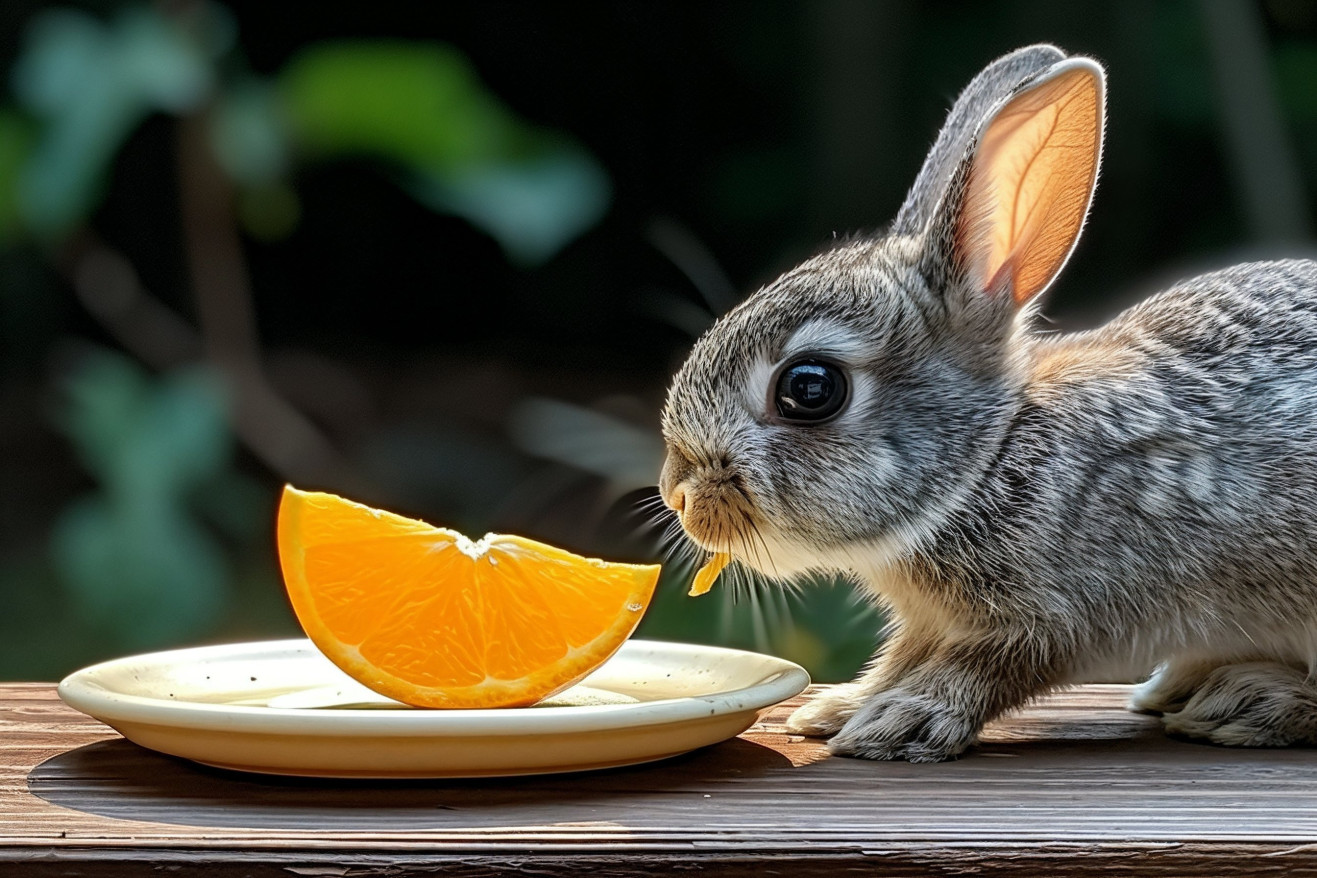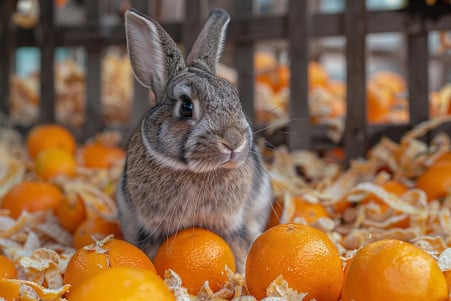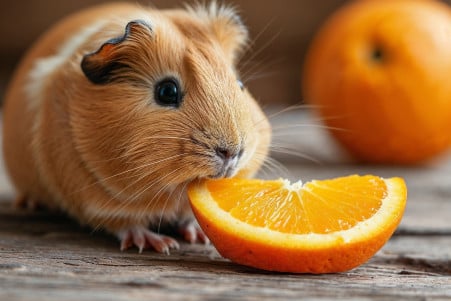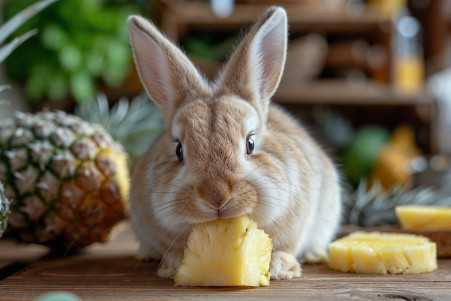Can Rabbits Have Oranges? Safe Citrus Feeding Tips for Your Pet
4 February 2024 • Updated 6 February 2024

Oranges are full of sweet, juicy flavor, but can you give your rabbit a slice for a snack? Rabbits can have oranges in moderation, but you’ll need to make sure you take the peel and seeds off and only give them small, seedless pieces every once in a while to prevent potential digestive upset from the acidity and sugar in the fruit.
As always, make sure you’re introducing new foods slowly and keeping an eye on your rabbit’s well-being.
This in-depth look at the pros and cons of giving your rabbit oranges covers a wide range of studies in veterinary nutrition, animal science, and horticulture. It will give you a better understanding of rabbit digestion, the nutrients in oranges, and how to give treats to rabbits safely.
The aim is to make sure you’re meeting your rabbit’s dietary needs while still being able to give your pet a tasty treat, so you can feel confident and your rabbit can stay happy and healthy.
Can rabbits have oranges?
How a Rabbit’s Digestive System Works
Rabbits are hindgut fermenters, a unique classification among herbivores, and their digestive system is highly dependent on a high-fiber diet. According to Purina Animal Nutrition, the cecum, which is comparable to a cow’s rumen, is especially important because it breaks down fiber through microbial action.
This helps with digestion and also leads to the creation of volatile fatty acids, which are a valuable source of energy. Supreme Petfoods adds that rabbits eat cecotrophs, which are fecal pellets that are reingested and produced by the cecum, to absorb important nutrients, which again highlights the importance of fiber and the dangers of a high-sugar diet.
While rabbits do best with a diet that includes fibrous foods like hay and vegetables, sweet foods like oranges can cause problems with their sensitive digestive systems. Sugar can lead to obesity and can also disrupt the balance of microbes in the rabbit’s gut.
According to the journal Veterinary Clinics: Exotic Animal Practice, rabbits’ digestive issues are more likely to be caused by a lack of fiber than an overabundance of sugar, but that doesn’t mean that sugar is good for them.
Watch for signs of digestive upset, such as changes in the consistency of your rabbit’s fecal pellets or a loss of appetite, which are signs that you should take your rabbit to the vet. A well-balanced diet for a rabbit will help ensure that they stay healthy and will also allow you to give them the occasional sweet treat responsibly.
Oranges for Rabbits: A Nutritional Review
Oranges are a nutritional goldmine, packed with vitamins and antioxidants that can help support your rabbit’s overall well-being. A study from Healthline notes that a medium orange is an excellent source of vitamin C, providing 92% of the Daily Value, and is also high in fiber, which is essential for a rabbit’s digestive system.
Oranges also contain essential minerals like calcium and potassium, as well as bioactive compounds such as flavonoids, which have anti-inflammatory effects, and carotenoids, including beta-cryptoxanthin, which can increase their antioxidant capacity.
However, the same sugar content that makes oranges so nutritious can also make them dangerous for rabbits. According to Animal Hearted Apparel, the sugar in oranges means that they should be fed to rabbits in moderation to avoid obesity and dental issues. The Spruce Pets also notes that fruit should make up no more than two percent of a rabbit’s diet to avoid potentially fatal gastrointestinal problems like ileus.
Given that rabbits are meant to eat a diet that’s high in fibrous greens and low in sugar, this means that oranges should be fed to rabbits with caution. Small, seedless, and peeled orange segments can be a fun treat for rabbits.
The key is to make sure you’re feeding them in moderation and monitoring your rabbit’s reaction—start with a small amount and watch to see how your rabbit responds. This will help ensure that oranges can be a safe and fun addition to your rabbit’s diet.
Best Practices for Feeding Rabbits Oranges and Other Citrus Fruits
Because of the potential risks, it’s important to be cautious and thoughtful when feeding your rabbit oranges or other citrus fruits. First, make sure to choose seedless oranges and remove all seeds, which may contain anti-nutrients that are toxic to rabbits, according to A-Z Animals.
While the orange peel is a good source of nutrients, it may also contain pesticides, so Rabbit Care Tips recommends feeding your rabbit organic orange peels, if you feed them to your rabbit at all, and only in small amounts.
As with any new food, especially one like oranges, it’s important to watch your rabbit for signs of digestive issues and adjust their diet accordingly. This means starting with small amounts of the fruit and gradually increasing it to ensure that it remains a small part of their overall diet, which, according to the House Rabbit Society, should be made up mostly of hay and leafy greens.
If you’re looking to add variety to your rabbit’s diet, there are many other treats that are safer and more appropriate to give them, including leafy greens and an occasional sampling of other rabbit-safe fruits. By following these tips, you can make sure that citrus fruits are a fun and healthy part of your rabbit’s diet.
How to Incorporate Oranges Into Your Rabbit’s Diet
A diet that includes a daily serving of hay, as well as fresh vegetables and a small amount of pellets, is the foundation of a healthy rabbit diet. The RSPCA explains that fresh, clean water and good quality hay or grass should make up the majority of a rabbit’s diet, as this is what their digestive system has evolved to eat.
The RSPCA goes on to say that pellets should be fed in small amounts and that muesli-style foods should be avoided due to the health problems they can cause.
It’s best to think of fruits, including oranges, as a special treat rather than a regular part of a rabbit’s diet. VCA Hospitals explains that fruits should be fed in moderation because the sugar they contain can upset the balance of a rabbit’s gut flora. If rabbits eat too much fruit, they can develop problems like obesity and dental disease, so it’s important to limit the amount and frequency of fruit treats.
Rabbit.org also recommends that treats, including fruits, should make up less than 5% of a rabbit’s diet. Feeding a variety of rabbit-safe fruits, like apple slices, blueberries, or pears, in very small amounts will help ensure that these sweet snacks are an occasional treat and a healthy part of a balanced diet. This will help ensure that rabbits stay healthy while still getting to enjoy the occasional sweet treat.
Potential Hazards: Oranges and Bunny Wellness
If you’re thinking about giving your rabbit a sweet and juicy orange, it’s important to note the potential digestive problems that can arise from the high sugar content in the fruit.
A cautionary post from Animal Hearted Apparel warns that if your rabbit is experiencing symptoms like lethargy, loss of appetite, or a gurgling stomach, it could be a sign of indigestion.
Over time, overfeeding rabbits oranges can lead to obesity, and the high acidity in oranges can also lead to dental issues. In addition, the use of pesticides on non-organic oranges is another potential issue, as the chemicals on the skin can be toxic.
If your rabbit does have a negative reaction to eating an orange, it’s important to stop giving them citrus immediately. Pet Keen recommends that you talk to your vet to make sure that you’re making the right dietary changes to ensure that your rabbit is healthy.
Part of being a responsible pet owner is understanding the potential effects of your pet’s diet, and that’s especially important when it comes to their wellness.
And as always, remember that it’s important to keep things in moderation. If you’re ever in doubt, opt for treats that are specifically designed to meet your rabbit’s dietary needs.
Conclusion: Rabbits and the Sweetness of Oranges
In summary, rabbits can enjoy the sweetness of oranges in moderation. However, it is important to remember that while oranges have some nutritional value for your rabbit, they also have sugar and acid, which can be detrimental if consumed in excess.
To make sure that oranges are safe for your rabbit, make sure to remove the peel and seeds to avoid any digestive issues and introduce the fruit slowly to make sure that your rabbit doesn’t have any negative reactions.
It is important to stress that you should only give your rabbit oranges in moderation and that they should not be a regular part of their diet. It is also important to make sure that you are monitoring your rabbit’s health when you introduce new foods so that you can catch any digestive issues quickly.
It is important to make sure that you are managing your rabbit’s diet responsibly, and by following the suggestions above, you can make sure that you are giving your rabbit a sweet treat without putting their health at risk. Just remember that your rabbit’s diet should be high in fiber with hay as the main component, and that sweet treats like oranges should be given in moderation to keep your rabbit healthy.


